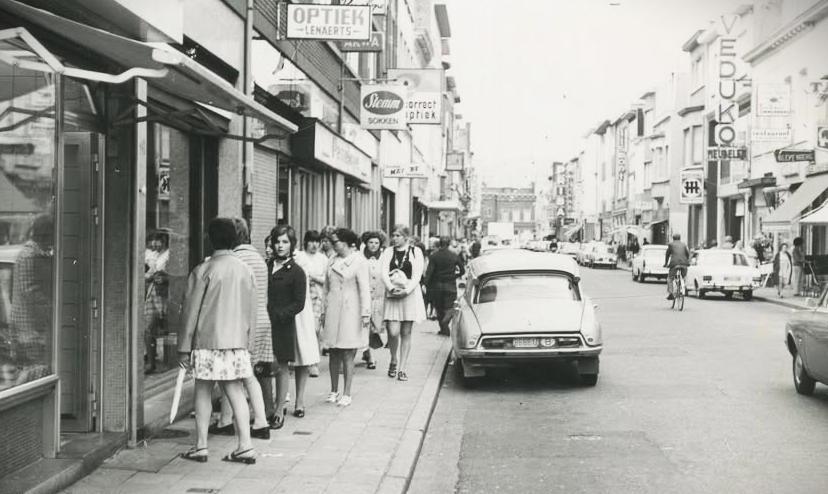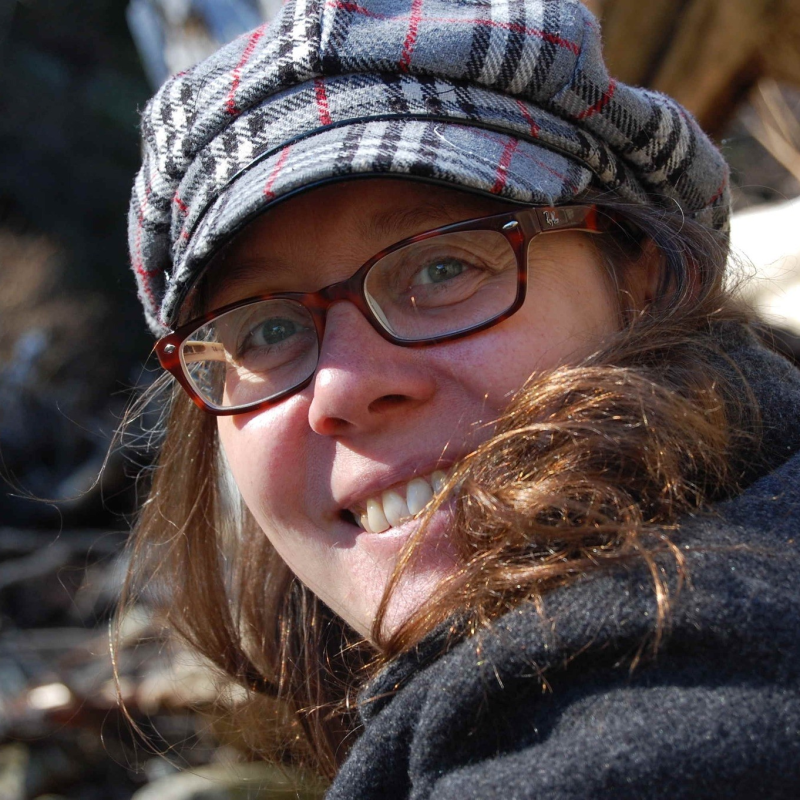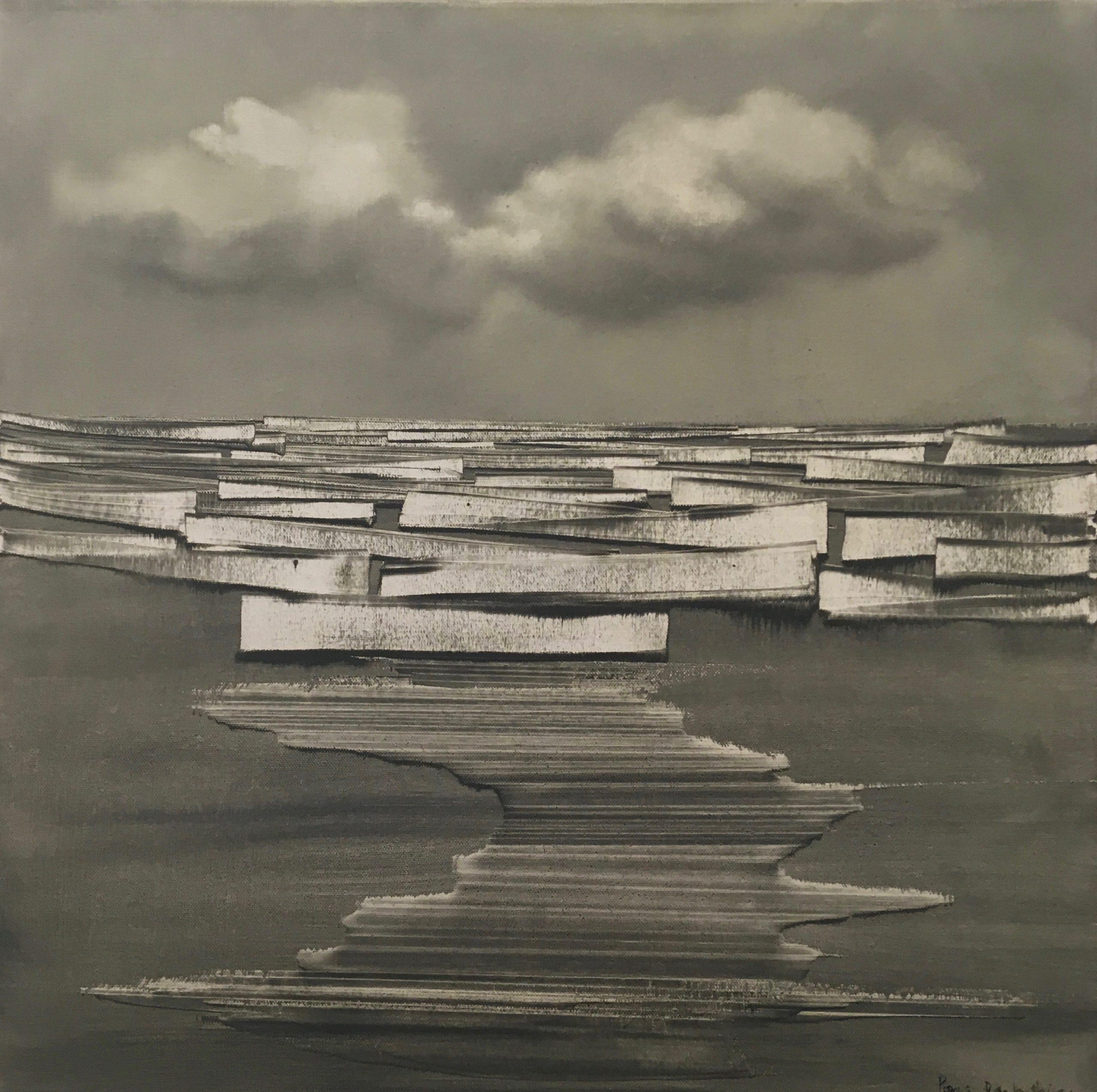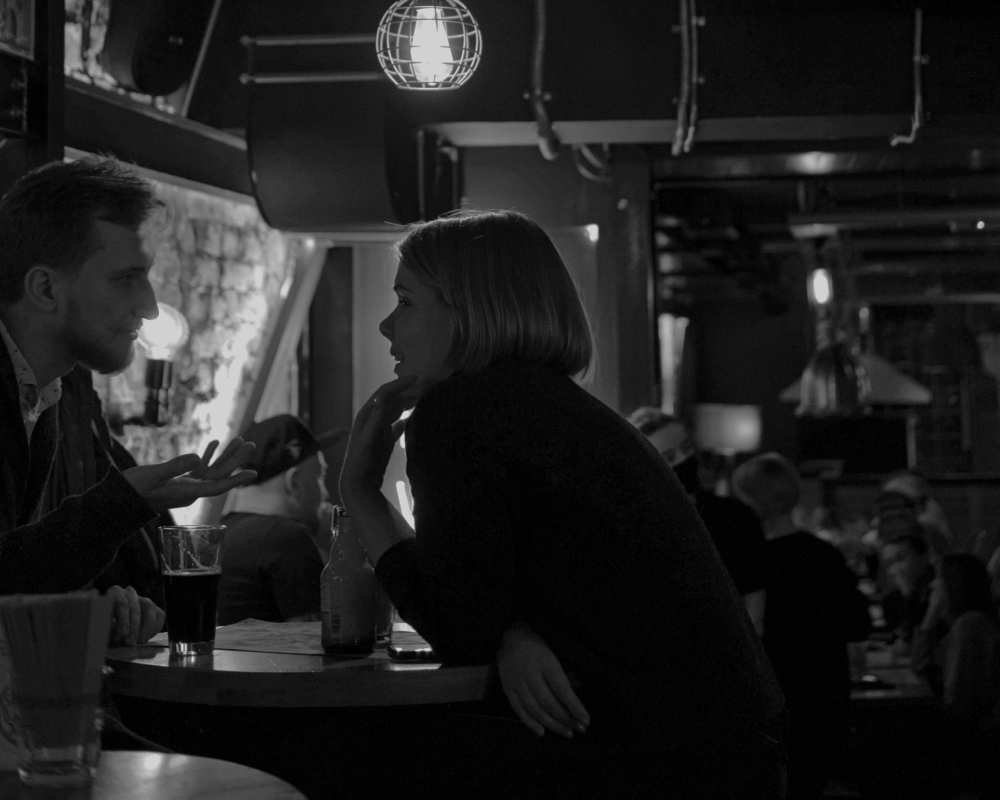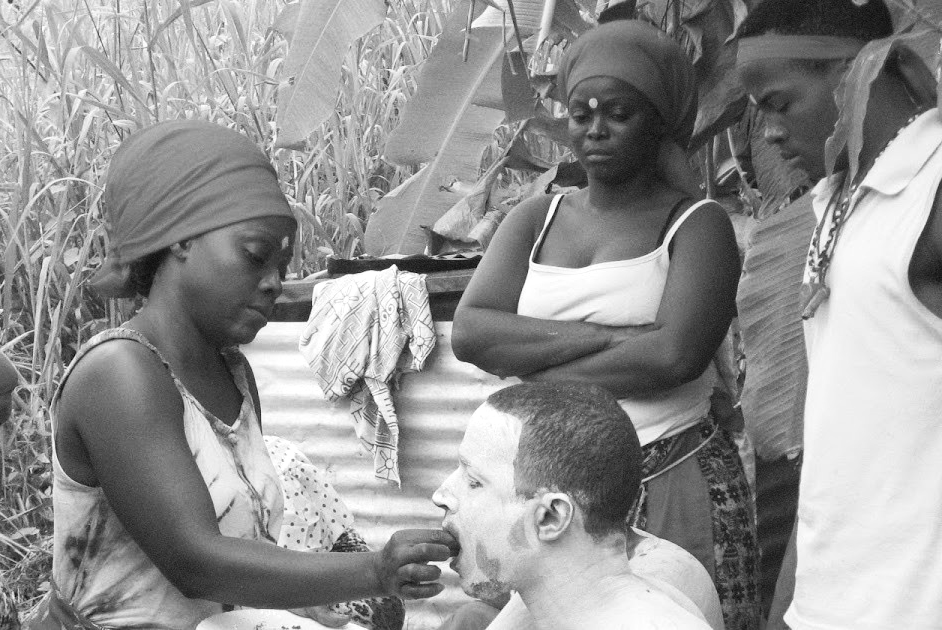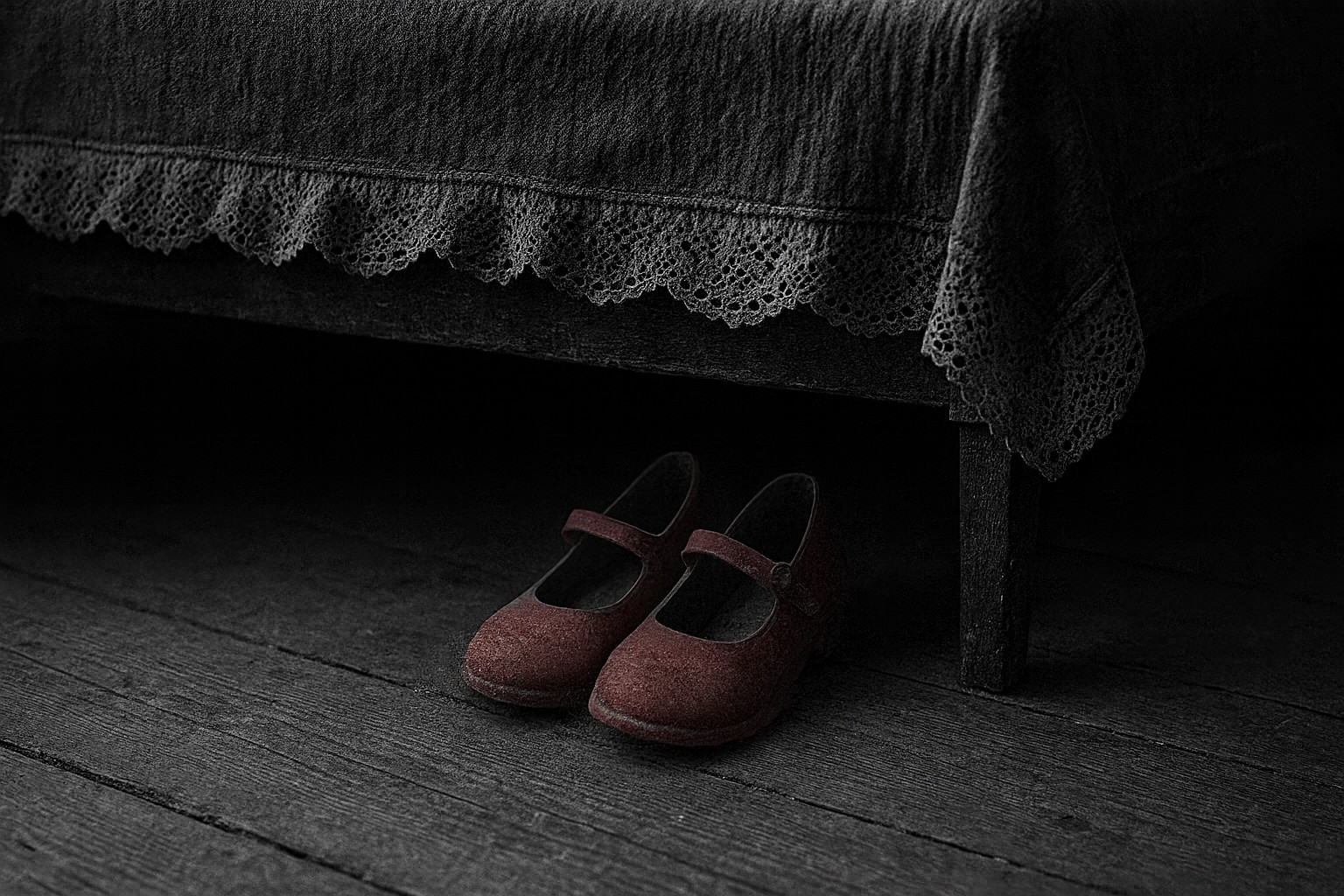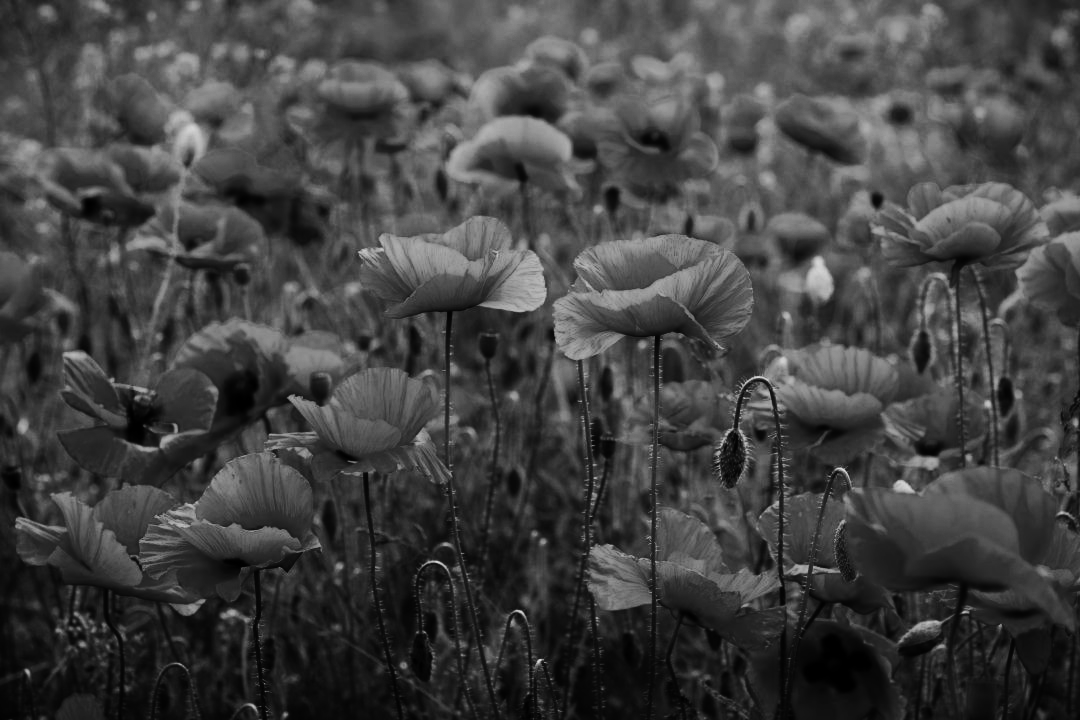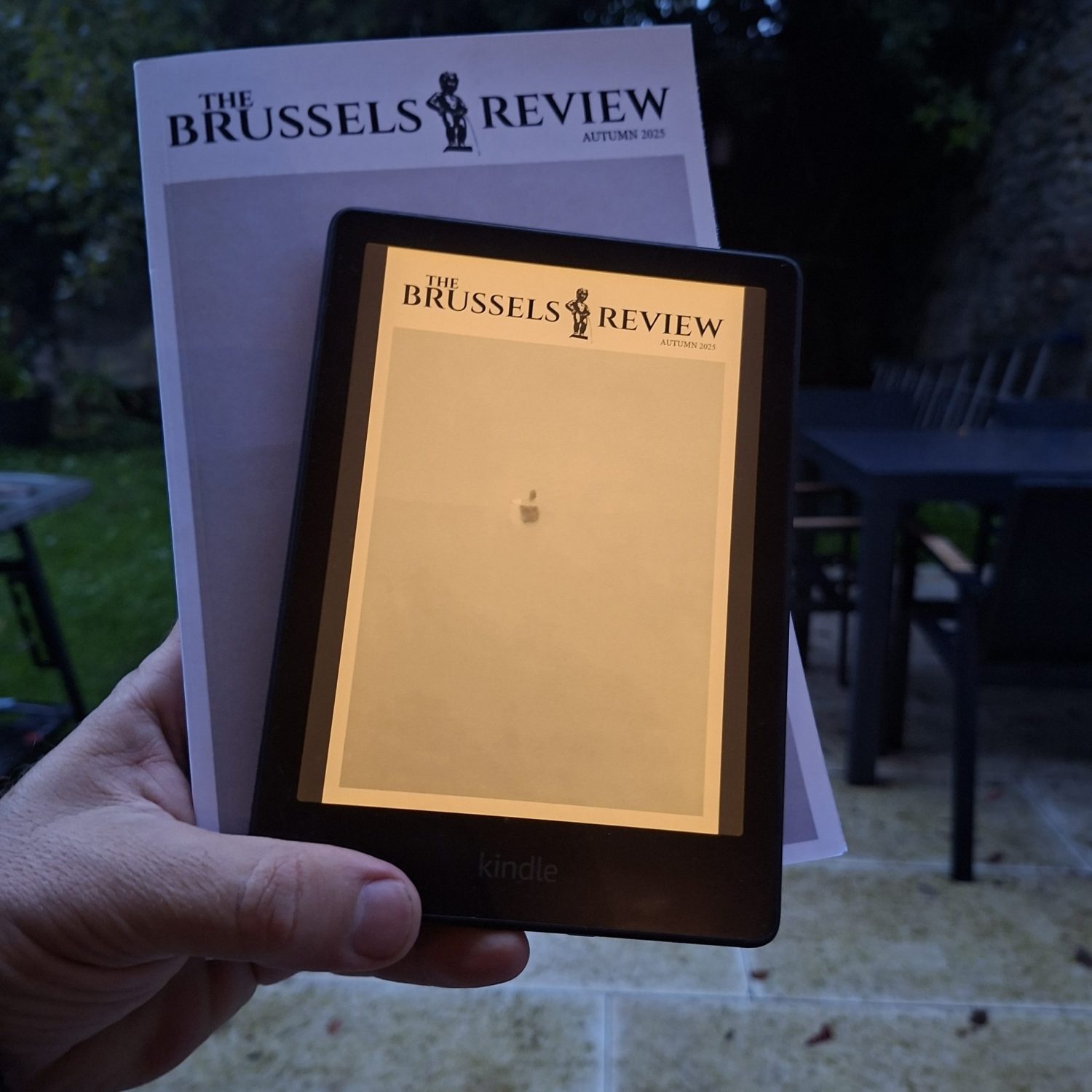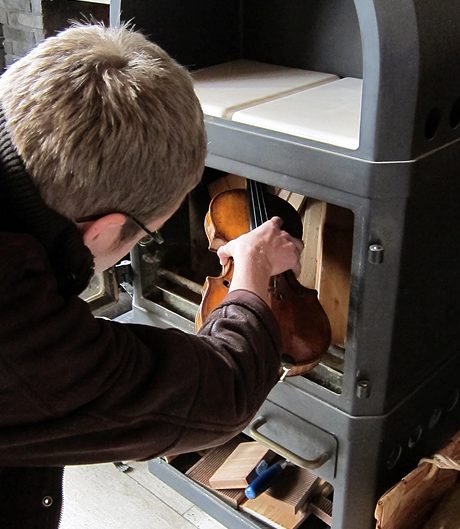Ria needed a place in Antwerp, something cheap. The commute to architecture school was grueling, first a bus and then a packed streetcar. Only five feet tall, Ria felt claustrophobic squeezed between taller bodies. Just that morning a hand had landed on her buttock. When she looked over her shoulder, men in suits were staring into the distance. She couldn’t move away till the next stop. All day the memory of the groping fingers burned her skin.
After class she walked around the neighborhood. The city was sticky with late summer heat and it smelled of exhaust, the grease of French fries, and garbage decomposing inside the metal street bins. Cyclists tinkled their bells while they wove between cars that crawled forward on the narrow roads. A streetcar shrieked as it turned the corner. The strap of her bag cut into her shoulder and sweat pooled around her armpits. At the cafes people sat outside, drinking foaming beers, the glasses covered with a pearly mist of condensation. Ria stopped in front of a house without curtains in the upstairs windows. She rang the bell.
A few minutes later the large, wooden door opened, and an old man looked curiously at her. He wore a grey cotton work-coat — long-sleeved with big, plastic buttons in the front.
“Hi! Sorry to bother you but it looks like the upstairs is vacant. Do you know if it’s for rent?”
“The owner died,” he said, “and the relatives are quarrelling. The house might be sold soon.” He paused and looked her over. “Or not for a while. Who knows.”
“That’s okay. I don’t mind if it’s just for a few months.”
He told her to talk to René, the captain of the Mirabella, which was moored on The Little Island, the northern end of the old port.
Ships now unloaded containers further up the river and as Ria got closer to the old docks, the city emptied. Traffic rumbled in the distance. She passed a corner café with mother-in-law’s tongues lined on the windowsill. A car drove by. Across the street a man skirted the houses as if trying to melt into their shade. Red light gleamed from a shop. Inside the window a woman sat on a chair, skinny legs sticking out from her leopard housecoat, her old skin incongruous with the silver stilettos. She looked away as Ria hurried by.
At the dock, sailing ships and riverboats bobbed, tied with ropes to steel bollards. Seagulls squawked above. It felt spacious there. Ria walked along the edge reading the ships’ names.
The Mirabella seemed abandoned, but after a few minutes a bearded man appeared. René said he was happy to let the apartment to Ria for fifty dollars, ridiculously cheap, even for the late ’Seventies.
The next Saturday, Pa helped her move.
“You’re sure about this? There isn’t even a shower.” He flipped the light switch. The bulb fizzled.
“I can wash at the kitchen sink. It has hot water.”
Her father stood at the doorway looking uncertain.
“I’ll be fine,” Ria said. She could save so much time, living just a block away from the Academy. She didn’t mind that the apartment was just a tiny bachelor’s.
Hundred and twenty students had registered for first year and by November the class had broken up into small solid groups. Ria stood in the cafeteria line with her friends Ben, Ann, and Luc awaiting French fries covered with a spoon of sloppy beef stew.
“I heard that only thirty-five of us will be allowed to pass,” Ben said. He was lanky with a bob of blond hair, a wide smile, and nervous fingers that were always smoothing things, or folding papers into small squares — sugar cube wrappers, napkins, receipts.
“It’s easy for a school to keep a high profile if it only lets the top of the class pass,” said Luc, who had worked in construction during the summers. “I’m not learning much in the design studio.”
“Me neither,” Ann said. “I wish I had gone somewhere else.” She was one of the few girls and she usually wore patterned bell bottoms, cropped tops, and a leather jacket, unlike Ria who just wore jeans and a loose T-shirt or a hand-knit sweater.
“I try not to think about next year,” Ria said. “I just keep my head down and work.”
Over lunch, Ben kept bringing up a sailing holiday he was planning in the summer holidays. How he was going to catch up on party time. “Haven’t you noticed how all the guys are dating girls from Interior Design? Or artists?” he said in a wry voice. “Girls they meet in the hallway because there’s no time to go out.”
They laughed. It was so true. Ria too resented the amount of study time, but she didn’t mind the long hours of design work. She enjoyed the monk-like concentration, the silence at night while the city slept. The main problem was that her bed was squeezed between her wardrobe, workbench, and drafting table. There was hardly any space to move around, and she asked Ernest if she could use the attic. He ran a printing business on the main floor and as his press nearly filled the whole front room, he usually stood in the hallway, in his grey work-coat, watching the paper slide out in a slow and steady pace. He always nodded when she rushed past him.
“I thought I could sleep up there,” she said.
He didn’t mind. He had enough storage space in the rear, in the lean-to.
“I used to live upstairs, you know, when I just started out, in the late thirties and forties.”
“No way! You lived here during the V1s and V2s? That must have been so scary!” Pa had told her about the high whistling sound as a flying bomb approached, the silence when it hovered in the air, ready to drop. The fear — how close would it fall? Between the liberation and the end of the Second World War, Antwerp had been the only port to access Northern Europe and the Germans had heavily bombed it.
Ernest shrugged. “You get used to everything. It’s just like when it starts to pour, and you find the protection of an alcove. The bombs weren’t that different. When the siren went off, I found shelter. Waited till it was over.”
Growing up, Ria had encountered many physical remnants of a dangerous past: bullets in old trees, shrapnel in the bricks of the old municipal hall, cracks that ran like lightning in the walls of her grandparents’ home. As a small child, she ran her fingers over them, wondering. Sometimes, out of the blue, her parents would spit out a bite of story, in one or two clipped sentences, fear in their voices, but whenever Ria asked questions about that time in their lives, they clammed up and a tense silence would fill the room. In high school, the history teacher had skipped the two German wars altogether, even though they were in the curriculum.
“We’ve run out of time,” the teacher had said. And that had been that.
Ernest’s nonchalant response surprised Ria. He seemed untainted by the past.
A few weeks later, he told her he had hidden a Jewish family.
“What! Here at the house?”
He nodded. “Yes, my friend Gabriel, his wife and little Sarah. She was such a sweet little thing. Very quiet.” He smiled to himself, like he was thinking of a good joke. “I was working for the Germans,” he said, “printing their bulletins. I hid the whole family right under their noses.”
“You were working for the Nazis?! Those pigs!”
Ernest shrugged. “Some soldiers were bad apples and some were just ordinary folks put inside a war.” He stuck his hands inside his pockets. “After the liberation, we executed each other in the streets. That’s what the war had done to us.”
He had printed for the White Brigade too. “In the evenings, with the blinds down.”
A friend of Ria’s mother had been caught working for the resistance and Ma kept his photograph in her secretary desk. Looking for a pen, Ria had found a copy of the letter he had written to his parents on the evening before his execution.
“You were playing with fire.”
“A bit.” He smiled.
By June, Ria was still at the apartment. All month she worked on her end-of-year project, a row house. She opened it in the middle and let sun stream through a gigantic skylight into a split-level interior. Stairs zigzagged the void. She added plants to her sketches, green tendrils sneaking up the balusters. An indoor jungle. Gradually, sketches, notes, and blueprints covered the walls of her room. When the drawings were done, she started the model. During the slow repetitive work of cutting and gluing balsam wood, she sometimes thought about the Jewish family, how they had walked around the room in socked feet, with slowness and caution, the clicking and clacking of the printer’s press a cover for their soft shuffling. How much had little Sarah remembered from her previous life? Maybe only fragments remained. As days slid into nights, time warped and Ria’s recent high school years gained a sense of unreality, like a dream or a movie that had happened to somebody else — the parties, the crushes, the long bike rides through the countryside with her friends Christine and Isabelle, the laughter while they lay in the grass and fantasized about being eighteen, when their lives would begin. The freedom.
During the last week, Ria survived on coffee, Callebaut, and Gauloise cigarettes. She barely finished in time.
On the morning of the jury, Ria taped her drawings to the wall, tired but satisfied.
“It looks great,” Frank said. His drawings hung next to hers.
“Yours too.”
“Crossing my fingers. There are a lot of good projects.”
Ben joined them. He looked even more nervous than usual. “Did you see Sven’s?” Sven was two years older and had attended art school beforehand. His sketches were always evocative. You felt you could just step inside them. “His model looks totally professional, as good as the ones made in a shop.”
When it was Ben’s turn, the jury gave him a seven. He beamed. Ria thumped his shoulder, Luc gave him a quick hug, and Ann, who was standing in front of her own project, gave the thumbs up, smiling weakly. She was next. As a girl, she would be grilled hard.
The old, plump jury member questioned her placement of the kitchen and breakfast nook in the back, looking out over the garden. “That’s the best place of the house,” he said. “You should have put the living room there.” And the young, tall juror didn’t like her cozy sitting pit. “That’s so passé.”
They let her pass, just.
She let out a long sigh. Then burst into tears and laughter.
When it was Ria’s turn, her hands trembled and she tried to keep her voice steady. While she was explaining her concept, the old juror looked over his glasses and mumbled, “That powder-room looks tiny.” He pulled a small scale from his breast pocket and measured the toilet, the door, the space to the sink.
“It works.” He sat down again.
“You’re not plastering the walls, expecting the bricklayers to build your wallpaper?” he asked.
“If they know it will be visible,” Ria said. “They’ll do clean work, like they do for the façade.”
The old juror snorted but her teacher said, “It will look nice, with the wooden windows and the indoor garden.”
The jurors deliberated in whispers. The whole room always fell silent at this moment. Then, her teacher announced her grade, a nine.
It shocked her. The acknowledgement fizzed in her head.
“It’s because you’re a girl,” Ben hissed in her ear. “The teacher had an erection. You could see the bulge in those tight pants he’s wearing.”
“Come on, Ben. I don’t even wear make-up.”
He turned around. Walked away.
By the end of the day, eighty students had failed, including Luc. He had left after receiving his grade. They were asked to leave their projects overnight. Nobody else had received an A. Not even Sven.
The next morning, the room felt morose. The stress gone, Ria felt deflated. Many students she liked had failed — like Frank who was rolling up his drawings next to her.
“It’s easy to make it when you’re a copycat,” he said.
“What! What are you talking about?”
“You copied Sven’s design. He told everyone.”
“I heard it too,” said Luc, who was passing them, drawings under his arm, model balanced on the other hand. “Don’t let it get to you, Ria. They’re just jealous.”
Sven was still in the room, at the far end of it, and Ria confronted him.
“Your entry path curves and blends into the front yard,” he said, “like mine. You stole that idea.”
When she pointed out what a tiny detail it was, he said nothing.
“I hadn’t seen your work,” Ria said, “till yesterday. You know that.”
After the summer break, Ria ran into Ben in the hallway of the academy. They walked together up the marble stairs.
“How was your sailing holiday?”
“Great.” He hurried up to the second floor where all their classes would be now. On the landing the other students were waiting on the couch, the easy chairs, and the floor, eyeing each other like street boys who had encountered a rival gang. Ben and Ria stood to the side.
“Well, here we are,” Sven said. “The survivors.”
“They’ll only allow twenty-five in the third year,” Ben said.
Ria didn’t know if this was the rule, or if more students just fell away because of the engineering courses and the larger amount of design work.
“You have nothing to worry about,” Sven said. “You just sailed through last year.” He took a packet from his pocket and shook out a cigarette. “Want a smoke?”
Ben scurried over.
If he had a tail, Ria thought, he would wag it.
Over the next weeks Ben followed Sven around like a shadow. Gradually, Sven pulled the other boys into his orbit and formed a solid clique. Ann had transferred to the school in Ghent and Sabine, the only other girl, always hung out with her boyfriend, who was in the fourth year. She wore long skirts and tailored jackets and lived in Brasschaat, an upper-class neighbourhood just outside Antwerp. In the mornings, a car dropped her off. When Ria talked to her after class, Sabine answered politely and cut the conversation short.
Mid-October, a postcard from Luc arrived, of the Horta House in Brussels, showing a curved sunlit stairway.
Ria, the light made me think of your project. Come see it for yourself and grab a beer with me. (I’m trying my luck in Saint Lucas.) Luc.
Ha, Luc was back in architecture school, in Brussels this time. Good for him. Ria pinned the picture to the wall across her drafting table.
The second years were waiting on the landing — a half-hour break before Building Technology. The sound of voices, steps running, doors opening and closing traveled up the stairs and echoed against the walls. Everyone was smoking, drinking coffee from Styrofoam cups, or eating chocolate. Ria took out a pouch of tobacco and started rolling a cigarette. Sven had let the rumor stand and everyone avoided her, didn’t even answer if she talked to them. Who knows what other lies Sven had made up? Would it be better to transfer like Ann and Luc had, and miss out on learning from the star architects in the higher years? Sven opened a binder and pulled out a piece of paper, the weekly art homework. Most students brought still lifes or sketches of buildings. Sven had drawn a nude. Even from a distance Ria could tell it was well done with fine, soft lines. A woman lying on a bed, hand resting on her chin — the face Ilka’s, the girl from the jewelry department who Sven was dating. As the guys passed the drawing around, Sven seemed to grow larger, his chest out. He’s showing off that he slept with her, Ria thought. Does she know he’s passing her body around? Letting everyone finger the paper? I’m so tired of these boys. Oh, God. Give me some women.
She got up and walked out. The clouds broke and a golden autumn sun spilled down, bounced off buildings on the other side of the square, buffed a signboard to a gleam. Women’s Cafe. Ria laughed. The cafe seemed to have appeared out of nowhere, plunked down there just for her, an instant wish fulfillment. Had it always been there?
When she opened the door, women of all ages looked up, then resumed their conversations. The cafe was a bit grimy, with wooden chairs and tables. Ria ordered a coffee at the bar.
A young woman slid off her stool and walked over. She was tall and angular with long blond curls.
“Your first time here?”
“Yep.”
“I’m Annick,” the woman said. “You live around here?”
Annick was a hairdresser. Before long they were laughing together.
“It’s nice to have some new blood here,” Annick said. She ordered a beer and moved a bit closer, leaned into Ria.
“Oh,” Ria thought. It’s that kind of women’s café. She stepped back. “Got to get to class.”
“Well, you know where we are.”
Ria didn’t think she’d return but over the next weeks the hostility of the boys chafed her the way an icy wind finds its way inside your clothes, biting into your soft parts. Ria shrunk further inside herself. Was this how it had been for her parents during the war, always having to hide their thoughts and feelings? When Ria returned to the Women’s Cafe, Annick, who was now working the bar, smiled warmly. Something tightly coiled inside Ria released, a relief like when you take off a too-tight bra not realizing how much it had been cutting into your flesh.
Ria spent the winter break at her parents’. It snowed. Then the temperature dipped below zero for several days.
On Sunday Isabelle called. “Let’s go skating at Fort Five,” she said. “The moat is frozen solid.” Jerome, her nine-year-old nephew, was begging her to go. He was staying at Isabelle’s for the holidays while his mother was touring The Netherlands, performing folk music in bars and small venues. “He brought his skates,” Isabelle said. “Maman usually takes him to the rink in the afternoon.”
This severe frost was unusual, and Ria was excited to skate outdoors. The area surrounding Fort Five was fallow and covered with broom, which in summer turned into a sea of yellow but now looked ghostly, the snow on the bushes frozen rigid. They resembled strange animals bewitched into a deep sleep.
Jerome was the first on the ice, rushing off at high speed, the squirrel ears on his knitted hat swaying with his strong strides. Ria and Isabelle followed at a leisurely pace, the scratching of skates the only noise on this gloomy morning, the sunlight dimmed by a lead-gray sky.
Jerome circled them, dashed between them, then raced toward the far end where two teenage boys were fastening their skates on the bank. Jerome jumped to a stop.
The guy in a fleece denim entered the moat and swooped up Jerome’s squirrel hat. Jerome caught up but the guy held the hat high while Jerome jumped up and down. Then he tossed it to his friend who waved it in the air. “Come and get it.” Jerome looked close to tears.
“Cut it out!” Ria said. “Give the hat back.”
“What’s with you?” The guy spun it around. “We’re just having some fun.”
“You coward!” She skated toward him, cutting her blades into the ice with short, hard strikes. “Bullying a little kid. Shame on you.”
“Ho, ho.” The guy pushed the hat into her chest. “It’s not like I want this babyish thing.”
Isabelle took Ria’s arm. “Come on, let’s go.” She pulled Ria away, Jerome at their heels. “Why did you yell at them? It was just a game.”
“They were ganging up on him.”
Isabelle proposed to go home and have some hot cocoa. “We can come back later.”
“It’s not us who should leave.” But Ria felt like a balloon with the air gone out and hot cocoa at Isabelle’s was always delicious, made with full milk and lots of bitter Callebaut melted into it.
When Ria returned to Antwerp, her front door stood ajar. The hallway smelled of fresh coffee. Ernest’s press was replaced with two steel desks with wooden tops and a clutter of chairs. A guy with a brush cut, a tie, dress shirt, and ironed pants was lifting a typewriter from a box. Who her age wore this stuff? And where was Ernest?
The stairs creaked under heavy steps.
She leapt up to her attic.
Her mattress had been shoved to the side and a man was stacking boxes along the wall.
“Hey! What are you doing! This is my room.”
He straightened himself. “We’re renting the downstairs,” he said. “The attic comes with it.”
“No, it doesn’t.” She crossed her arms.
He walked toward her. Stopped really close. He had black, bushy eyebrows that met in the middle. “I’m with the Nationalist Student Association. We’re setting up an office downstairs. We need the attic for storage.”
Great! The Far Right! Invading her home! She stayed put and looked him straight in the eye. “I am Ria and I’ve been here since forever. This attic is mine.”
Dust danced in the sunlight that fell through the open skylight. A car honked. He leaned his bulky frame a bit more forward. He smelled of sweat and Eau de Cologne.
“You got the lean-to,” Ria said. “That’s what the previous tenant used for storage. He was here for decades.”
“Fine,” the guy snapped. He carried the boxes back down.
Ria sat on her bed, shaking. She should install a lock. Right away.
At dusk, Ria went to the Women’s Cafe, but the usual gang wasn’t there. Just Annick, behind the bar.
“What’s on tap?”
“Koning.”
While Annick poured her a pint with a small collar, Ria told her what had happened.
“No way!” Annick slammed the glass on the counter. “A bunch of fucking fascists. Right around the corner. That’s way too close.”
The beer was cold and perfect. “They’re just students.”
“Right. Have you forgotten what they did to people like us!”
“What?!”
“Come on, Ria. Pink triangles? Camps? Haven’t heard of it?”
Ria hadn’t. “People only talk about the Jews,” she said. “And anyway. This isn’t the forties. They can’t turn the clock back.”
“Really, Ria? This is how things always start. A small boy’s club. Before you know it, they’ll take over the city.”
“Come on, Annick. You’re catastrophizing.”
“You’re way too trustful!” Annick wiped the counter. “Aren’t you gonna move?”
“I love where I am.” Ria stared out the window at the sunny square and the academy beyond. Hadn’t she just stood up for herself? Not budged under the intimidation? She was not going to let herself be driven away, not by the fascists, and not by the architects. She could weather these guys, the whole lot of them.
Several decades later, Ria sits at her desk as light streams in through a large window. Architectural drawings are all digital now, yet Ria still sketches her designs in pen, not out of nostalgia — she loves the preciseness of computers, the ease of revisions — but drafting by hand activates a different part of her brain and ideas flow more easily. The tattoo on her wrist is fading — it is still visible, a blue dot between two small wrinkles. On one of those grueling nights in architecture school, the skin had broken where she had frantically tapped her rOtring pen. The finest one, the 0.05, always clogged and any other surface would damage the delicate point. She likes her one-dot tattoo, a discreet reminder of her own resilience. After Ernest left, the house had felt different. Without his quiet presence, the house was less of a sanctuary. Over the next months, while she struggled to hold on to herself, she had turned one of his stories over and over in her mind.
One day in summer, Ernest had told her, Lotar, a German soldier, was at his shop to look over a print proof. The wooden shutters were down to keep out the heat which the narrow streets trapped between their brick facades. Sun fell through gaps between the slats, drawing bright stripes on the floor, the paper, and the back of Lotar’s hands. The room smelled of paper and ink.
Ernest made a joke.
Lotar laughed then broke into a hacking cough. He put a white handkerchief against his thin lips and spit. Blood again.
“It’s the damp house I’m staying in,” he said. He wished he was home, with Sigrun and little Lisa and sitting in a wicker chair in the garden, in the fresh summer air, a book in his hand, the head of Bruno, his Great Dane, on his knee. Away from this city of people with hard eyes.
He picked up the pencil and made a note on the print. Ernest’s work was always meticulous.
That day Sarah was alone in the room, her mother in bed with a sore throat and a fever, her father in the dark kitchen, boiling water. Sarah bit her tongue while she drew a slow zigzag, copying the last of the letters Papa had written out for her. She put down the pencil and sat still. Dim light fell through the drawn curtains. The whole house was quiet.
She slid from her chair, and in the silent way her mother had taught her, she walked to the door. Her fingers curled around the metal knob. It felt smooth and cold. She bit her lip. This was forbidden. She brought her face close to the door and listened. A soft rumble of voices. Then a deep laugh. The knob clicked. Startled, Sarah let go. The door swung open. Beyond it, a hallway. She blinked against the sudden brightness. Sunlight bounced on a banister. She stroked the gleaming wood, followed it to the polished stairs. Below, tiles sparkled in patterns of red, yellow, and blue. In socked feet she slid down the stairs. She touched the cool ceramic, the vibrant colors. Just behind the open French doors stood a man, boots black and shiny. In his long fingers he held a pencil. It looped and turned, a dragonfly dancing on paper.
Sarah took a step closer.
From the corner of his eyes, Lotar saw a small head. Thick, long, brown curls inches away from his sleeve. A small pale hand landed on the table, next to his. He sucked in his breath. Who was the girl? The printer was a bachelor, living alone. Was he playing a double game? All his niceness a pretense?
Lotar glanced across the table. The printer’s face white and still. Lotar had the sensation of looking into a mirror, into eyes blue like his, the eyes of a man he now had to kill.
He lowered his gaze. In his hand he held a pencil. This hand had sliced bread, made love, carried a young child to bed. Now it held the weight of two lives. Maybe more. Power and fear sizzled through his veins. Is this what a cobra felt before it struck? He was light-headed. There would be blood on this hand, a child’s blood. Blood he could not wash off — like Lady Macbeth. When he returned home would Bruno smell the murders on him? Pull back in disgust?
Lotar felt as though he were standing atop a seesaw held at midpoint, in perfect balance, one foot in the air, just before the quick tipping forward. He had to shoot another man. A nice man. A man who just had made him laugh. If only the girl had not shown herself. If only he had not seen the girl.
This is it, Ernest thought. In a strange pool of calm clarity his mind rushed through the options. He could say the girl was his neighbor’s. The soldier would take them to her. She would wring her hands. Would she agree that Sarah was hers? If the soldier asked, she would not be able to give him the child’s name. More lives would be lost. The house would be searched. Gabriel and his wife. Would they know the girl was gone? Would they escape in time via the roof? Would he be questioned? Would he be tortured, until he spit out the names of the other resistance fighters? I have to kill the soldier. The thought arrived like a train. I have to grab the shovel next to the coal stove.
The soldier glanced up. Their eyes locked.
He’s a decent man, Ernest thought, and his heart filled with sorrow. If only the girl had not shown herself. If only the soldier had not seen the girl.
Neither man moved. Not more than a minute had passed.
The soldier put down his pencil and left.
No fascists stormed the stairs till many years later when Ernest had retired. The Jewish family continued their shadowy existence until Antwerp was liberated and refugees emerged from attics and basements, their pale bodies moving with hesitance in the bright open space.

